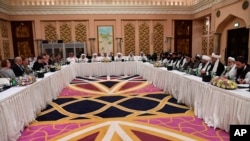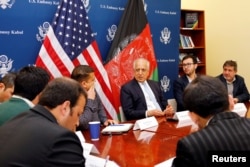Russia, the United States and China will this week try to press Afghanistan's Taliban insurgents to hold talks with Afghan politicians and civilians, an important step in a process aimed at ending the Afghan war.
Representatives of the three countries will meet Thursday in Moscow hoping to accelerate the pace of talks with the Taliban, days after the collapse of a meeting, aimed at bringing together rival Afghan sides, laid bare tensions that have hampered moves toward formal negotiations.
The U.S. Special Representative for Afghanistan Reconciliation Zalmay Khalilzad, who has held several rounds of direct talks with Taliban officials in Qatar, will attend the meeting in Moscow.
"On this trip, I am working to build on international support for Afghan peace process and push Afghan parties forward on dialogue and negotiations. A bump in the road isn't reason to slow down," Khalilzad said on Twitter this week.
Khalilzad has made some progress in his talks with the Taliban, in particular in two main areas: a Taliban demand for the withdrawal of U.S. and other foreign forces, and a U.S. demand the Taliban guarantee that Afghanistan will not be used as a base for militant attacks.
Two other main issues in the process are a cease-fire and talks between the rival Afghan sides, or inter-Afghan talks.
The Taliban have long refused to talk to the U.S. backed-Afghan government, denouncing it as foreign "puppet," and fighting has seen no let-up. The Taliban announced the launch of their annual spring offensive this month.
Two diplomats in Kabul said it was hoped the Moscow meeting could bolster an international push to ensure that the militants meet other Afghan representatives.
"China and Russia can put some pressure on the Taliban to meet Afghan representatives soon," said a Western diplomat on conditions of anonymity.
Planned meeting canceled
Last week, the Taliban objected to the size 250-member delegation of Afghan politicians and civil society figures, leading to the cancellation of a planned meeting in Qatar aimed at preparing for inter-Afghan talks.
The Afghan delegation included some government officials attending in a personal capacity. The Taliban derided the delegation, likening it to a "wedding party."
In recent months, Russia has held direct talks with Taliban officials and some Afghan politicians opposed to Afghan President Ashraf Ghani, promoting its role of power broker.
U.S. officials have called the Russian effort an attempt to "muddle" the U.S.-backed peace process.
Russian forces occupied Afghanistan through the 1980s in support of a communist government, triggering the first phase of warfare that has ground on ever since.

